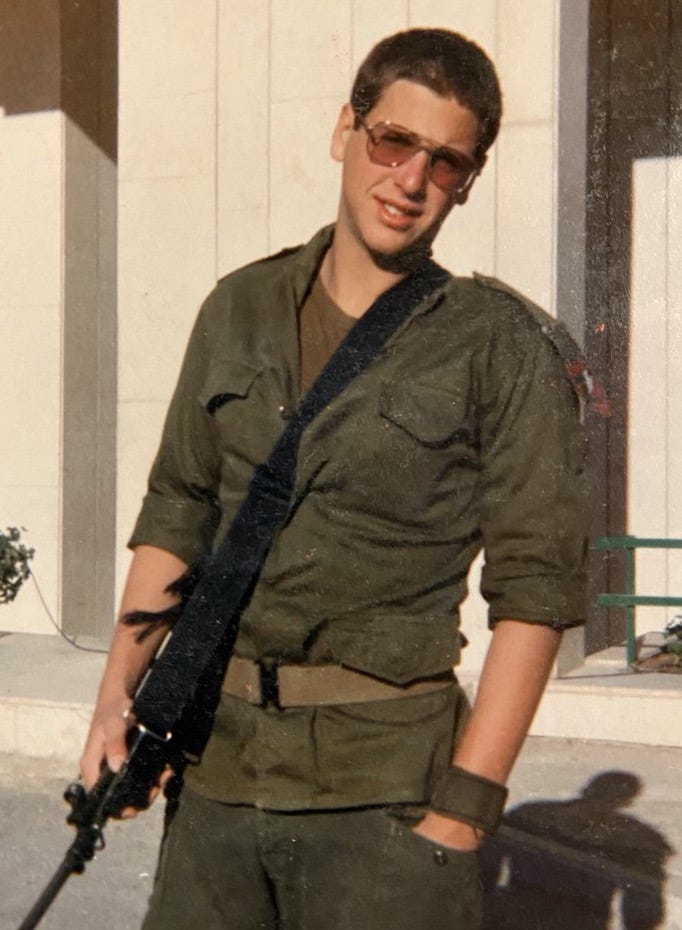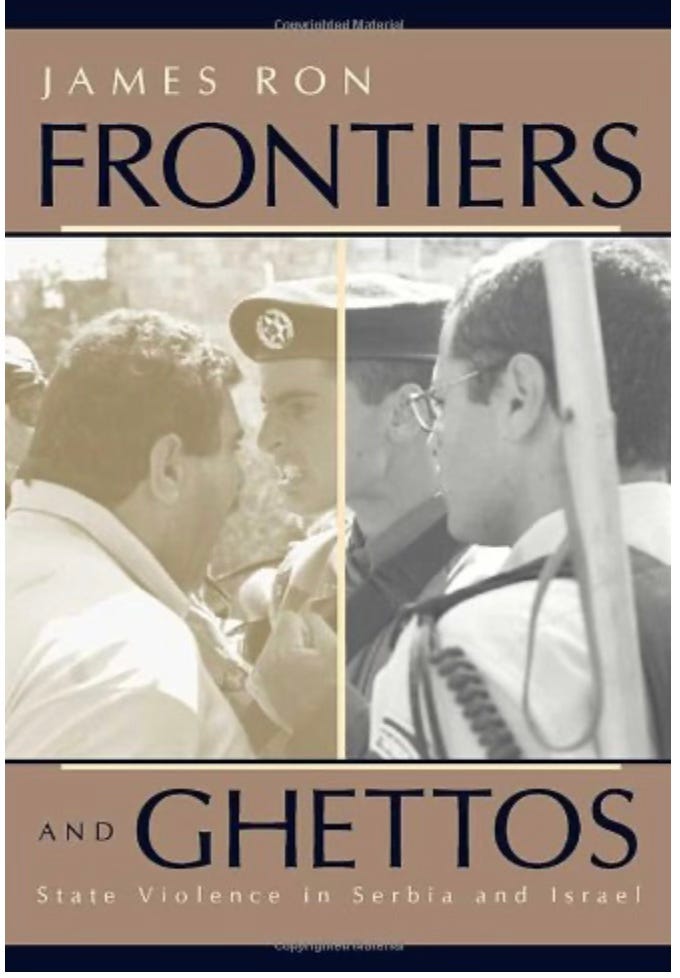Shame
A Letter to my Children
My children,
I am ashamed.
When I was your age, back in the mid-1980s, I volunteered for one of the most demanding units in the Israeli military, a small piece within the parachute brigade.
I was so proud of my military service. It was unique and difficult, and I was not a natural. My family had no distinguished military past, and I wasn't ready for the physical and mental toughness required.
I was also a new immigrant, having arrived in Israel only nine years earlier. It had taken me three years to learn Hebrew, and I was desperate to belong.
Excellence in military combat training seemed like the surest path to social acceptance, and I embraced that journey with every ounce of energy and commitment available.
I completed my three years of mandatory service in early 1988, but then volunteered for an even more aggressive unit in the reserves.
In all those years, I encountered unarmed civilians on only two occasions, both in Lebanon. I am not proud of those encounters, but they were limited. No one died, much to my relief.
Because of the unique nature of my reserve service, I was spared engagement with the first Palestinian uprising, or Intifada, which began in late 1987. Thankfully, I did not participate in the Israeli policing operations that became increasingly brutal, and that were written about so eloquently in Schiff and Ya'ari's excellent book, among many others.
In 1991, after preparing for a mission to hunt Scud missiles in Saddam Hussein's Iraq, I refused to train any further in the occupied territories. I didn’t want to be a part of that system, even though we only used the West Bank as a place to prepare for unrelated activities.
The military responded by burying my file in a bureaucratic black hole, and I never wore a uniform again.
In 2003, after studying at Stanford and UC Berkeley, I published a book attempting to specify the conditions under which Israel might engage in ethnic cleansing. That book, Frontiers and Ghettos, used social science and historical comparisons to predict when the unthinkable might occur.
In that book, I searched for a hypothetical trigger that might tempt Israel to engage in the worst kind of violence against Palestinians.
Today, those fears have come to pass.
The trigger was Hamas' brutal attack on October 7, 2023, and its violent taking of hostages, including young children.
Once that occurred, the Israeli military became an instrument of horrific suffering, engaging in criminal activities that violate almost every clause of the Geneva Conventions. These activities are also illegal under Israel's own laws and regulations.
In the first weeks and months after the Hamas attack, some of Israel's military actions may have been justifiable under the laws of war. Even the most horrible air or artillery strikes, for example, can be legal if they are proportionate and discriminate, and if reasonable precautions are taken to protect innocent civilian life.
This is the unfortunate truth embedded in the laws of war: not everything terrible in war is also illegal.
Many of Israel's actions are war crimes, however, as documented at great length by Hebrew University historian Lee Mordechai.
To be sure, there are many non-Israeli sources - NGOs, reporters, and others - who have documented Israel's crimes, but there are also plenty of Israeli sources, including, most recently, reports by the Israeli human rights group, B'Tselem, and its partner, Physicians for Human. Rights-Israel. The Israeli newspaper Ha'aretz also regularly documents these horrific events, as does the news website, +972, and many others.
I am not saying every Israeli soldier has committed war crimes. Far from it. Some of the men in my former military unit volunteered for the reserves at advanced ages, out of a sense of mission, duty, and a desire to safeguard their families. The Hamas attack made everyone in Israel feel unsafe, and these men wanted to restore a sense of peace and security to their towns and neighborhoods.
I know and love them, and believe they are behaving with honor.
Many others, moreover, including both younger reservists and ordinary soldiers performing their obligatory service, are also surely trying to do the right thing. The children of friends are serving in Gaza today, and if their parents have had any influence at all, these young men will not directly engage in atrocities.
It is important to remember, moreover, that the heaviest responsibility for the military's criminal behavior lies with the most senior commanders and the country's political leadership. Low-ranking foot soldiers rarely set the tone.
And yet, the Israeli military has collectively engaged in a crime of massive proportions in Gaza. Anyone who is part of that system, no matter how personally honorable, is being led, shoved, and drawn into that awful endeavor.
War crimes are always an individual matter and must always be investigated and judged on a case-by-case basis. Collective moral responsibility, however, is a real thing. Moral responsibility is different than individual legal responsibility.
After being bombed, machine-gunned, displaced, deprived of medical treatment, denied clean water, and tortured, two million Gazans are now being starved to death by the very same military I served in so enthusiastically, all those years ago.
We still have only patchy data on how many people have died to date, as so many Gazan Palestinians are buried under the rubble. Many others will die slow deaths in the months and years to come because they were repeatedly displaced, forced to sleep in the open, could not get the medicine they needed, or could not access medical treatment, clean sanitation facilities, clean water, or sufficient food. Older people, people with chronic diseases such as diabetes, young children, and other vulnerable individuals will be particularly at risk for morbidity and premature death.
Above all, it is the mass hunger now ongoing that is worthy of special mention.
Nothing can justify starvation. In wartime, its use is an unambiguous war crime. You can always claim that this or that air strike was justified because it targeted a Hamas military position, but the wholesale starvation of an entire population to pursue military or political goals?
Never justifiable. Never.
My children, this is not your war, and it is not your responsibility. Your mother and I made sure you were not born into that conflict, and have raised you far away, in a place refreshingly free from terrorism, ethnic violence, military conscription, and harsh repression.
But I am still tied to that world, through emotion, friendship, and responsibility, in part because of that earnestly pursued military service all those years ago.
So now, I turn to my fellow Israelis and ask:
What have we done? What have we become? How can we live with ourselves?
I fear the stench of collective shame may never wash off.
About James Ron
James Ron is an international research consultant who worked in higher education for 22 years. Before that, he was a journalist for the Associated Press and an investigator with Human Rights Watch, including in Israel and the Palestinian territories, Chechnya, Kosovo, Nigeria, and Turkey.
You can learn more about James on his website and LinkedIn profile. To read James' scholarly articles, please visit his ResearchGate and Academia.edu profiles. To learn how other scholars have used his work, please visit his Google Scholar page.




Thank you, Jim, for this letter, which I immediately forwarded to my children.
For many of us Diaspora Jews, your stance is very important because it demonstrates that not all Israelis are unanimous in their support of the crimes currently being committed by the State of Israel.
What is happening right now in Gaza represents for us a collapse of our belief in a Jewish state different from others, nourished by a Jewish ethic stemming from our history, consolidated for centuries in the Talmud, and which has fueled many schools of thought in the West.
Today, we must admit that Israel no longer has much in common with this ideal, that it is a country like any other, with its strengths and its dark sides. In short, a state that has little in common with the Judaism to which we belong.
This is a grief we must grieve, but it obviously has nothing to do with the one you are going through.
Jacques
Bravo. I had no idea that this was your life. It's a superb letter but, even more, a crystal clear analysis of the complexities of crime and war. Good for you.